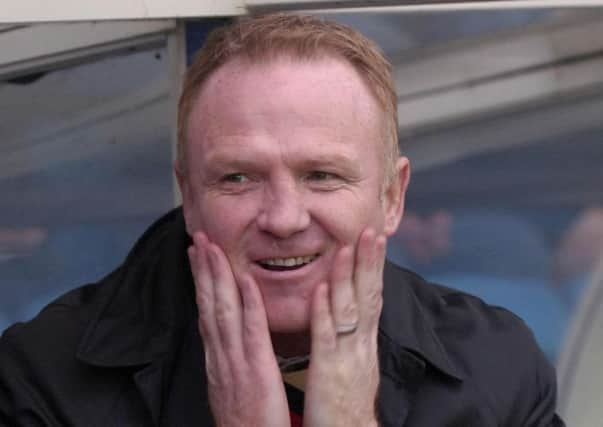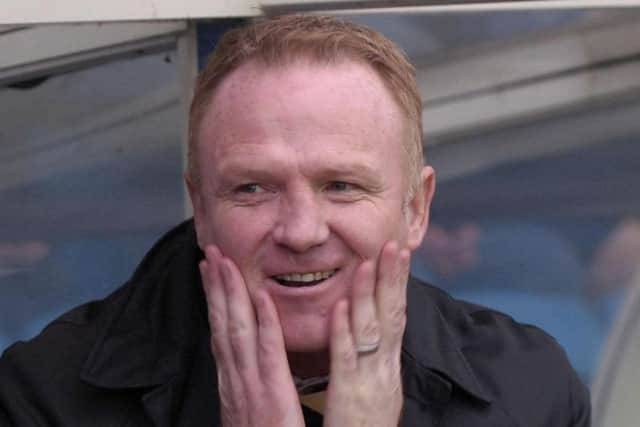Is Alex McLeish the right man for the Rangers job?


As he stepped down at the end of the 2005/06 season to make way for the incoming Paul Le Guen, Alex McLeish stated that he would never manage another Scottish club because he felt he had already ‘achieved everything in the Scottish game’. He also suggested to The Scotsman at the time that he wouldn’t be able to manage another Scottish club because he was ‘a Rangers man’.
In November 2013, however, McLeish conceded that he hadn’t ruled out a return to management in his homeland, telling the BBC: “You always feel like you’ve got something to prove. I’ve had a lot of success in the game and I feel that there’s more success in me.”


Advertisement
Hide AdAdvertisement
Hide AdBut he admitted that he ideally wanted a position in England or abroad, saying he had ‘unfinished business in England’ and that he could go abroad for a ‘different challenge’.
The following year he was appointed manager of Belgian side Genk, lasting from August 2014 to June 2015. Between February and May 2016, he had a 10-game spell in charge of Egyptian side Zamalek.
Since the start of this year, he has said ‘when you get asked to come to a club like Rangers then it’s for sure a hard decision to turn that down’ - after Mark Warburton left Ibrox - as well as making a very public pitch for the Scotland job, saying after Gordon Strachan’s departure that it would be very hard to turn down the chance to return to managing the national side and he could never rule it out.
He hasn’t had work for 18 months, and he last managed in Scotland ten years ago. So should Alex McLeish be considered for the Rangers job?


Post-Rangers form
McLeish’s 70 per cent win record in charge of Scotland is impressive for including victories over France in Paris, and the Ukraine at Hampden. But he was gone after just ten matches, joining Birmingham City in the English Premier League. During McLeish’s time at St Andrews, the club was relegated twice but won the League Cup in 2011 with an unexpected victory over Arsenal.
Days after the Blues were relegated at the end of the 2010/11 season, McLeish made the controversial switch to Aston Villa. Birmingham were enraged at the manner of McLeish’s appointment and several hundred Villa fans actually protested outside Villa Park. Unsurprisingly, he lasted just one season at Villa. He did avoid relegation but only recorded four home league victories over the course of the campaign.
After leaving Villa, he took the reins at Nottingham Forest but lasted just 40 days. High-profile spats with the club’s owners, four defeats in seven matches and a broken promise over transfer funds led to his exit in early 2013.
McLeish ended his managerial exile by taking over at Belgian side Genk in August 2014 but could only steer the Flanders outfit to seventh behind Charleroi and Kortrijk, and was relieved of his duties in June 2015.
Advertisement
Hide AdAdvertisement
Hide AdHe found a new job in February 2016, making another surprise move to Cairo to manage Egyptian side Zamalek. McLeish clashed frequently with an owner who felt he should pick the team rather than the manager, and the Scot left after just 65 days and ten matches in the Egyptian capital, despite leading Zamalek to an improved league placing.
His best win rates were as Scotland manager and at Zamalek - where he took charge of just ten matches on both occasions. Those two spells aside, the closest he came to replicating his form at Rangers was at Genk, where he won 18 out of 35 matches, drawing 10 and losing seven to leave him with a win rate of 51.4 per cent.
His win rates at Birmingham (36.9 per cent), Villa (21.4 per cent) and Nottingham Forest (14.3 per cent) don’t make for great reading for a man who recorded a 47 per cent win rate at Hibs prior to joining Rangers.
Results and performance during his first stint at Ibrox
During his four-and-a-half year stint in charge, McLeish oversaw 235 games, winning 155, drawing 44 and losing 36, giving him a win rate of 65.95 per cent. But the win rate - McLeish’s best in club management and career second best after his 70 per cent win rate in charge of Scotland - masks two seasons without a single trophy (2003/04 and 2005/06). McLeish was also at the helm for a club record ten games without a win during the 2005/06 season, which ultimately led to Rangers failing to catch Hearts and finishing third in the league as a result.
Despite the club’s domestic form, McLeish did take them into the last 16 of the Champions League - the first Scottish team to progress through a European group stage - where they were eliminated on away goals by Villarreal.
McLeish did bring home seven trophies during his Ibrox tenure; one more than his Celtic counterpart Martin O’Neill (who departed Celtic the season before McLeish exited Ibrox) but if any one word could be applied to McLeish’s time as Rangers manager it would surely be ‘inconsistent’.
A return to Rangers would see McLeish tasked with attempting to catch Celtic but also have to deal with an Aberdeen team accustomed to finishing second, a Hibs side that is going well under Neil Lennon and a Motherwell side that knocked the Gers out of the Betfred Cup and defeated Aberdeen at the weekend. A 2-0 loss to Hamilton, the bizarre ending to the 1-1 draw with Kilmarnock and the meek Europa League exit at the hands of Progres Niederkorn suggest McLeish would have a huge task on his hands - and the former Hibs and Motherwell boss had his own ‘Progres’ moment during his time as Rangers boss in losing on away goals to little-known Czech side Viktoria Zizkov in the UEFA Cup in 2002.
If McLeish struggled in the early 2000s he’d almost certainly struggle in the current climate - more than a decade since his last experience of Scottish club management.
Transfer acumen
Advertisement
Hide AdAdvertisement
Hide AdMcLeish made some shrewd acquisitions during his time at Ibrox - particularly Nacho Novo, Thomas Buffel and Dado Prso - but he also brought in some questionable signings, such as Filippo Maniero, Dragan Mladenovic, Moses Ashikodi and Bojan Djordjic.
Other transfers, like Egil Ostenstad, Emerson and Nuno Capucho are widely regarded by fans to be among the club’s worst signings of all time.
There is no doubt that McLeish was hampered by financial constraints. Rangers were simply no longer able to fork out £12-13 million to sign players of Tore Andre Flo’s calibre, as McLeish’s predecessor Dick Advocaat had managed.
The wage budget was slashed, prominent players such as Barry Ferguson and Lorenzo Amoruso moved on and McLeish had to deal with a squad mainly composed of older players on fairly sizeable salaries.
McLeish was forced to turn to free transfers, as well as dipping into the domestic market for players like Kris Boyd, Gavin Rae and Ian Murray, and he brought through the likes of Chris Burke, Alan Hutton and Ross McCormack.
But he would almost certainly have to alter his approach if he was to return to Ibrox. Rangers don’t have the money they used to and McLeish would presumably have to rely heavily on the club’s revamped scouting network, given he hasn’t managed in the UK since early 2013 and would have to spend some amount of time getting up to speed with the Scottish game.
Fans’ reaction
McLeish’s arrival in December 2001 was something of an anti-climax after the success under Walter Smith and the big-spending glory days under Advocaat.
Fans felt his appointment was symptomatic of the club’s need to reduce their outgoings; a ‘cheaper’ option, although he had been linked with West Ham United on the back of his work with Hibs.
Advertisement
Hide AdAdvertisement
Hide AdMcLeish hadn’t won anything with Motherwell - he managed a second-place finish, ironically behind Rangers in the 1994/95 season - and while he won promotion with Hibs from the First Division and took them to third spot (and subsequently Europe) in the 2000/01 season, supporters didn’t appear convinced he was the right man for Rangers.
It seems fair to assume that, given his appointment the last time divided opinion, McLeish returning for a second spell would do likewise - especially at a time when Rangers really need a proven manager to give the club a lift.
Verdict
The evidence suggests that McLeish returning for a second spell at Ibrox wouldn’t go well for either the individual or the club.
Since quitting Scotland for Birmingham, McLeish has struggled to replicate the form that won him plaudits at Motherwell, Hibs, during his first season at Rangers and his brief stint in charge of the national team.
Despite that, a return to Scottish football could end up being the catalyst to revitalise McLeish’s career.
His rapid U-turn from expressing a belief that he would never manage in Scotland again to touting himself for the Rangers and Scotland jobs on more than one occasion within the last 12 months suggests a man desperate for a return to management and keen to reinvent himself in the country where he enjoyed success in the early stages of his career.
To do that, however, he would need time as well as a patient board and a fanbase prepared to accept the odd hiccup as part of a rebuilding effort. McLeish would almost certainly not be afforded that luxury at Ibrox.
If he did return to Rangers, and failed to spark a resurgence, the fans would likely turn on him very quickly.
The chances of the Ibrox board being prepared to take such a risk after Pedro Caixinha’s turbulent tenure must be slim at best.